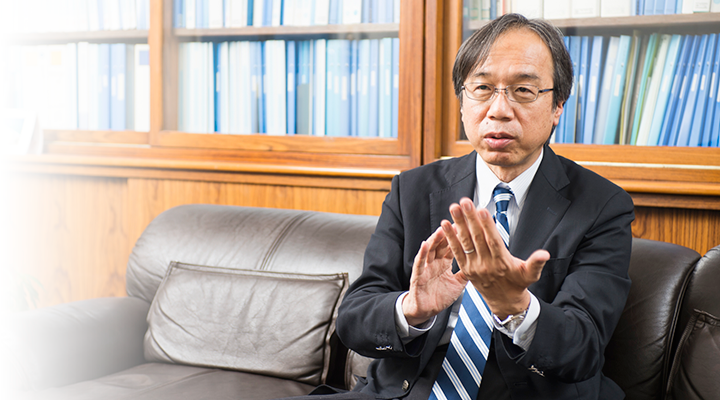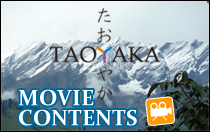
INTERVIEW
Achieving manufacturing activities gentle to people and the planet
through structuring tailored systems to regional attributes
Developing production systems and
production management systems
that are compatible with
the user country
Technical Creation Course
Graduate School of Advanced Science and Engineering
Prof. Katsuhiko Takahashi
Achieving manufacturing activities gentle to people and the planet
through structuring tailored systems to regional attributes
Thinking about humankind’s future from researching production systems and production management technologies

Professor Takahashi specializes in industrial engineering, with a focus on the production systems engineering field.
Aiming for an efficient structuring the increasingly complicated and diversified production systems together with production management framework that is flexible with changes in manufacturing environment, Professor Takahashi studies their fundamental mindsets and approaches, as well as necessary methods including optimization and planning. A production system is a series of frameworks in creating products and services to deliver to clients.

Since the 1970s, Japan has especially developed and implemented unique production and management systems to maintain global competitiveness. Professor Takahashi’s research, which academically assesses such Japanese systems is drawing significant attention. His series of research pertaining to Toyota’s kanban system, known as the “Japanese-style monozukuri system,” won the Association Award from the Japan Industrial Management Association (FY2009).
Why can Japan create products with high quality and productivity? Studies on this topic are actively conducted even overseas, with some basing their research on Professor Takahashi’s findings. On the other hand, research on developing technological transfers to other countries as well as studies on next-generation production systems and management systems for further advancement are in progress.

Professor Takahashi says, “We have to deliberate whether or not the methods in Japan can be applied internationally. Japanese ways assume the Japanese attribute of punctually doing what is told, but that doesn’t pass overseas. We need to think of effective methods specifically for other countries.”
The research eyes the world beyond Japan. In other words, the research considers the future of manufacturing activities for us mankind.
Acquiring fundamental learning for system engineering together with basic attitudes to resolve problems

Professor Takahashi is in charge of the “Advanced Systems Planning” class in the Taoyaka Program.
Students learn the foundations of system engineering and issues, the approaches and processes that are fundamental in formulating and resolving issues.
In addition, as lectures for specific systems, the positioning of basic production systems, or recent production systems and production management systems that developed on the basis of the basic production system are described, and each lecture ends with student discussions on issues pertaining to the lectured content.
Also, for the “specific production systems and manufacturing management systems” to be covered in the later phases of the class, students will conduct reading and discussion on the latest relevant research papers together with the lectures.
Professor Takahashi encourages students taking this educational research class:
“Individual technologies are required to be evaluated as an integrated structure during technical creation or when applying and implementing technology created as solutions for actual issues. Furthermore, fundamental approaches and concepts are required to be combined with relevant technology. I hope the approaches and methods learned in this class are utilized when having to see developments from bird’s-eye views.”
Heightened anticipation upon seeing Taoyaka students mature

Professor Takahashi also has great expectations towards this program as a committee member of the Taoyaka Program’s on-site education.
“It is important to approach issues with both arts and sciences thinking. Connecting the collaborative works of students from both fields to technical creation, implementation and cultural creation is something that is essential to the globalized era. I hope many leaders capable of being driving forces will be fostered through this program.”
Professor Takahashi reviewed specific deployment methods upon visiting Nepal, one of the proposed sites for on-site education, last year as a committee member. This year’s destination was unfortunately changed to another region following the recent earthquake, but the professor plans to continue such supportive activities for the program.
In addition, Professor Takahashi commented on participating Taoyaka Program students in his class.
“I feel so much vibrancy when looking at the current Taoyaka students. They seem to be experienced. For example, discussions are very active during group discussion sessions after class. Students play leader roles in the discussions before I know it. For these reasons as well, I am expecting a lot from the Taoyaka Program.”
Professor Takahashi also gave words of advice for students.
“Conventional approaches, methods, systems and technology are not necessarily applicable as they are in disadvantaged areas. Instead, it is necessary to thoroughly consider what is being required, what should be done and what the issues are to create and implement technology. Developments may lead to creation of culture, which will call for consideration towards the culture previously created. I wish students to work together with peers, conduct discussions and come up with satisfactory conclusions upon maintaining this attitude.”
![]()
Katsuhiko Takahashi Professor
Electrical, Systems, and Control Engineering Program, Division of Advanced Science and Engineering, Graduate School of Advanced Science and Engineering
April 1, 2020 – Professor, Graduate School of Advanced Science and Engineering, Hiroshima University
April 1, 2003 – March 31, 2020 Professor, Graduate School of Engineering, Hiroshima University
April 1, 2001 – March 31, 2003 Associate Professor, Graduate School of Engineering, Hiroshima University
April 1, 1994 – March 31, 2001 Associate Professor, Faculty of Engineering, Hiroshima University
July 1, 1993 – March 31, 1994 Associate Professor, Faculty of Management, Hiroshima Prefectural University
April 1, 1989 – June 30, 1993 Lecturer, Faculty of Management, Hiroshima Prefectural University
April 1, 1986 – March 31, 1989 Research Associate, School of Science and Engineering, Waseda University





